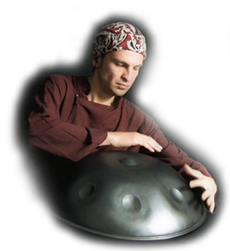Video: "Takku Ta Tei" feat. Anton Davidyants
- Font size: Larger Smaller
- Hits: 75783
- Subscribe to this entry
- Bookmark

Nadishana - portable dzuddahord, hybrid kaval, beer can, glass bottle, hadgini udu, jaw harp, composition.
Anton Davidyants - 4-str. bass
Takku Ta Tei - the folklore of nonexistent nation. Nonexistent music on nonexistent instruments. This is an example of what i call "inner folklore". I was grown up in the country where traditional culture is killed, but one cannot survive without roots! So the answer to this situation is to grow the "folklore" from within yourself. The song is pretty much all about that.
I want to express my sincere thanks to Anton Davidyants for learning and playing this crazy bass part. He accepted the challenge despite it was really uncomfortable part. to make it work. As you see on the video he even uses his left thumb to make some chords with long stretching and he has to tune one string quickly half tone down and then back, because this piccolo bass does not have enough range to cover the written part.
About unusual instruments used in that video:
Stringed instrument with sitar-like sound is a new portable version of Dzuddahord made by my request http://nadishana.com/index.php/en/stringed/item/230-dzuddahord
It has 6 individual sitar bridges (javari) for each string and played with mizrab (sitar plectrum)
It has a lot of complex electronic inside very small body and collapses to fit in a small bag! Weigth - 2,6 kg. The dream of multi-instrumentalist :)
The woodwind instrument is hybrid kaval, an experimental instrument. You can play with different embouchures on it as you see on a video. Here I use turkish position (in a corner of the mouth) and khakass siberian position (on a 3rd tooth)
Some junkphones are used on that video as well. Regular beer can which i found at the trash. It has wonderful long sustained sound with 3 clear harmonics, which you can isolate (as on tabla). I play here with harmonic isolation technique: I have my left thumb most of the time on a membrane to isolate highest overtone, unlike on tabla, where they use right ring finger for the same purpose.
Glass bottle is what we use in Siberia to preserve vegetables for the winter. It works great with the brush (see the accompaniment during bass solo).
Jaw harp is a chinese kou xiang. It was recorded live in a Monkey Forest (Ubud).
Filmed in:
- Bali: Changgu seashore & Ubud Monkey forest
- Germany: Sound Microsurgery Department studio & Berlin Aquarium
- Russia: Art-Mamuka studio, Moscow
Julia Surba - design concepts, filming
Produced by Nadishana @ Sound Microsurgery Department, Berlin, June 2014
Special thanks:
Aquarium curator Rainer Kaiser
Filming in Moscow: Mamuka Helashvili









